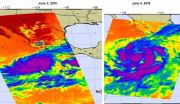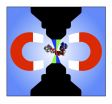(Press-News.org) Placenta doesn't prevent postpartum depression, ease pain, boost energy or aid lactation
Celebrities spike trend, but no studies show human benefits
Unknown risks to women and babies
CHICAGO -- Celebrities such as Kourtney Kardashian blogged and raved about the benefits of their personal placenta 'vitamins' and spiked women's interest in the practice of consuming their placentas after childbirth.
But a new Northwestern Medicine review of 10 current published research studies on placentophagy did not turn up any human or animal data to support the common claims that eating the placenta -- either raw, cooked or encapsulated -- offers protection against postpartum depression, reduces post-delivery pain, boosts energy, helps with lactation, promotes skin elasticity, enhances maternal bonding or replenishes iron in the body.
More concerning, there are no studies examining the risk of ingesting the placenta, called placentophagy, which acts as a filter to absorb and protect the developing fetus from toxins and pollutants, scientists said.
The study will be published June 4 in Archives of Women's Mental Health.
'There are a lot of subjective reports from women who perceived benefits, but there hasn't been any systematic research investigating the benefits or the risk of placenta ingestion,' said corresponding study author Dr. Crystal Clark. 'The studies on mice aren't translatable into human benefits.'
Clark is assistant professor of psychiatry and behavioral sciences at Northwestern University Feinberg School of Medicine and a psychiatrist specializing in reproduction-related mood disorders at Northwestern's Asher Center for the Study and Treatment of Depressive Disorders.
Placentophagy is an unknown risk for the women who eat it and for their infants, if they are breastfeeding.
'Our sense is that women choosing placentophagy, who may otherwise be very careful about what they are putting into their bodies during pregnancy and nursing, are willing to ingest something without evidence of its benefits and, more importantly, of its potential risks to themselves and their nursing infants,' said lead author Cynthia Coyle, a Feinberg faculty member and a psychologist.
'There are no regulations as to how the placenta is stored and prepared, and the dosing is inconsistent,' Coyle said. 'Women really don't know what they are ingesting.'
Research is needed to provide the answers, Coyle said. She also hopes the study sparks conversations between women and their physicians about their post-birth plans, so doctors can inform their patients about the science or lack thereof and support patients in their decision-making process.
Clark became interested in placentophagy after some of her pregnant patients asked if eating their placentas would interfere with their antidepressant medications. She was unfamiliar with the practice and began to ask her other patients about it.
'I was surprised that it was more widespread than I anticipated,' Clark said.
Although almost all non-human placental mammals ingest their placenta after giving birth, the first documented accounts of postpartum women practicing placentophagy were in North America in the 1970s, the study reports. In recent years, advocates and the media have popularized health benefits of the practice, and more women are considering it as an option for postpartum recovery.
'The popularity has spiked in the last few years,' Clark said. 'Our sense is that people aren't making this decision based on science or talking with physicians. Some women are making this based on media reports, blogs and websites.'
The authors of this paper are currently gathering data on the perceptions, beliefs and placental practices of health care providers internationally and nationally, as well as patients locally, and whether providers are recommending placentophagy to patients.
INFORMATION:
Dr. Clark's research is supported in part by grant K12 HD055884 from the Eunice Kennedy Shriver National Institute of Child Health & Human Development of the National Institutes of Health.
Northwestern news: http://www.northwestern.edu/newscenter/ END
One of the instruments that flies aboard NASA's Aqua satellite looks at tropical cyclones using infrared light. In a comparison of infrared data from June 3 and 4, images show that Hurricane Blanca had weakened and became less organized.
The Atmospheric Infrared Sounder or AIRS instrument that flies aboard NASA's Aqua satellite measured cloud top temperatures in Blanca on June 3 at 20:17 UTC (4:23 p.m. EDT) when maximum sustained winds were near 140 mph (220 kph) with higher gusts. At the time, Blanca was a category 4 hurricane on the Saffir-Simpson Hurricane Wind Scale. ...
DURHAM, NC -- There aren't any giants or midgets when it comes to the cells in your body, and now Duke University scientists think they know why.
A new study appearing June 3 in Nature shows that a cell's initial size determines how much it will grow before it splits into two.
This finding goes against recent publications suggesting cells always add the same amount of mass, with some random fluctuations, before beginning division.
"It's like students going through college," said Lingchong You, the Paul Ruffin Scarborough Associate Professor of Engineering in the ...
The most aggressive largemouth bass in the lake are also the ones most prized by anglers. These are the fish that literally 'take the bait' and put the fun into both competitive and casual sport fishing.
Then, according to the rules of catch-and-release, the captive is unhooked and tossed back to swim away without any lasting consequences. But a new UConn study says there is an impact; the evolutionary path of a species may be on the line.
In a recent paper published in the journal PLOS ONE, a team of researchers led by Jan-Michael Hessenauer and Jason Vokoun of the ...
Armed with new knowledge about how neurodegenerative diseases alter brain structures, increasing numbers of neurologists, psychiatrists and other clinicians are adopting quantitative brain imaging as a tool to measure and help manage cognitive declines in patients. These imaging findings can help spur beneficial lifestyle changes in patients to reduce risk for Alzheimer's disease.
The concept that cognitive decline can be identified early and prevented by applying quantitative brain imaging techniques is the focus of "Hot Topics in Research: Preventive Neuroradiology ...
ATLANTA - June 4, 2015- Screening for colorectal cancer increased in lower socioeconomic status (SES) individuals after 2008, perhaps reflecting the Affordable Care Act's removal of financial barriers to screening according to a new analysis. The study, by American Cancer Society investigators, appears online in the journal Cancer.
The Patient Protection and Affordable Care Act (ACA) included a cost-sharing provision intended to reduce financial barriers for preventive services, including screening for colorectal cancer (CRC) and breast cancer (BC). To investigate whether ...
Withholding angiotensin receptor blockers (ARBs) for longer than two days after surgery is associated with a significantly increased risk of postoperative death, according to a study of more than 30,000 patients in the VA health care system by researchers at UC San Francisco and the San Francisco VA Medical Center (SFVAMC).
ARBs are prescribed for high blood pressure, heart disease and kidney disease, explained lead author Susan M. Lee, MD, an SFVAMC anesthesiologist and UCSF clinical instructor.
"For non-cardiac surgery, ARBs are commonly stopped on the day of surgery ...
Researchers at the University of Tokyo have succeeded in developing a new microscope capable of observing the magnetic sensitivity of photochemical reactions believed to be responsible for the ability of some animals to navigate in the Earth's magnetic field, on a scale small enough to follow these reactions taking place inside sub-cellular structures.
Several species of insects, fish, birds and mammals are believed to be able to detect magnetic fields - an ability known as magnetoreception. For example, birds are able to sense the Earth's magnetic field and use it to ...
The advent of online social networks has led to the rapid development of tools for understanding the interactions between members of the network, their activity, the connections, the hubs and nodes. But, any relationships between lots of entities, whether users of Facebook and Twitter, bees in a colony, birds in a flock, or the genes and proteins in our bodies can be analyzed with the same tools.
Now, research published in International Journal of Data Mining and Bioinformatics shows how social network analysis can be used to understand and identify the biomarkers in ...
SEATTLE - Physical activities, such as walking, as well as aerobics/calisthenics, biking, gardening, golfing, running, weight-lifting, and yoga/Pilates are associated with better sleep habits, compared to no activity, according to a new study from researchers at the Perelman School of Medicine at the University of Pennsylvania. In contrast, the study shows that other types of physical activity - such as household and childcare -- work are associated with increased cases of poor sleep habits. The full results of the study (Abstract #0246) will be presented during the poster ...
ITHACA, N.Y. - A new Cornell study of New York state apple orchards finds that pesticides harm wild bees, and fungicides labeled "safe for bees" also indirectly may threaten native pollinators.
The research, published June 3 in Proceedings of the Royal Society B, finds the negative effects of pesticides on wild bees lessens in proportion to the amount of natural areas near orchards.
Thirty-five percent of global food production benefits from insect pollinators, and U.S. farmers have relied exclusively on European honeybees, whose populations have been in decline for ...


